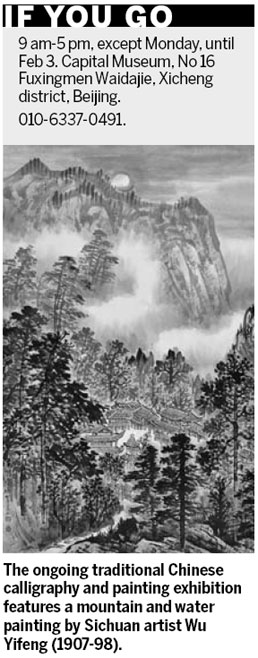Exhibition lures with breathtaking art from Sichuan
Updated: 2013-02-01 08:00
By Zhang Zixuan (China Daily)
|
|||||||||||
An ongoing Sichuan-themed traditional Chinese calligraphy and painting exhibition at the Capital Museum is wowing audiences with the amazing landscapes of Sichuan province and the vivid characteristics of Sichuan artists.

Hosted by the Sichuan Cultural Heritage Bureau and Chengdu Cultural Bureau, the exhibition features 103 pieces of artwork created by representative Sichuan-origin artists from different time periods, as well as artworks created by artists from other regions but preserved in Sichuan.
The most eye-catching work is the long-scroll painting The Land of Peach Blossoms created by Qiu Ying (1482-1559), who was considered one of the greatest artists in the Ming Dynasty (1368-1644). The work was once appraised as a "Folk National Treasure" in the TV program Treasure Hunt.
"The landscape is well composed, the houses and animals are exquisite, and the figures are true to life," comments Yang Xin, researcher and former deputy director of the Palace Museum. "In the Ming Dynasty, such high-quality work could only be done by Qiu Ying."
Another major item is a traditional shanshui (mountain and water) album created by 29 painting masters including Zhang Daqian (Chang Dai-chien) (1899-1983) and Pan Tianshou (1897-1971).
All the exhibited works are from the collections of Sandu Museum, a private museum in Chengdu, Sichuan province. This is also the first time for the Capital Museum to feature collections solely from a private museum.
"Private museums have helped the government to take up some responsibilities, and complemented the functions of State-owned museums," says Zhu Shuxi, director of Chengdu Cultural Bureau.
By the end of last year, Zhu says, there were 104 museums in Chengdu. Of these museums, 68 are private, comprising 15 percent of all private museums in China and a collection of nearly 3 million objects in total.
Among the Chengdu private museums several are exceptional. For example, Lianghe Wood Carving Art Museum claims to have the largest collection of traditional Chinese furniture. The Shu Brocade Museum is China's biggest demonstration and research center for Shu brocade and embroidery. And the Yuandao Museum is China's only museum of Taoism.
Opened in 2009, the Sandu Museum is a representative of Chengdu's comprehensive private museums. It has a fine collection of ceramics, bronze wares and stone carvings aside from paintings and calligraphies. The museum receives more than 1 million visitors every year. Entrance is free of charge.
zhangzixuan@chinadaily.com.cn
(China Daily 02/01/2013 page20)
Today's Top News
Police continue manhunt for 2nd bombing suspect
H7N9 flu transmission studied
8% growth predicted for Q2
Nuke reactor gets foreign contract
First couple on Time's list of most influential
'Green' awareness levels drop in Beijing
Palace Museum spruces up
Trading channels 'need to broaden'
Hot Topics
Lunar probe , China growth forecasts, Emission rules get tougher, China seen through 'colored lens', International board,
Editor's Picks

|

|

|

|

|

|





